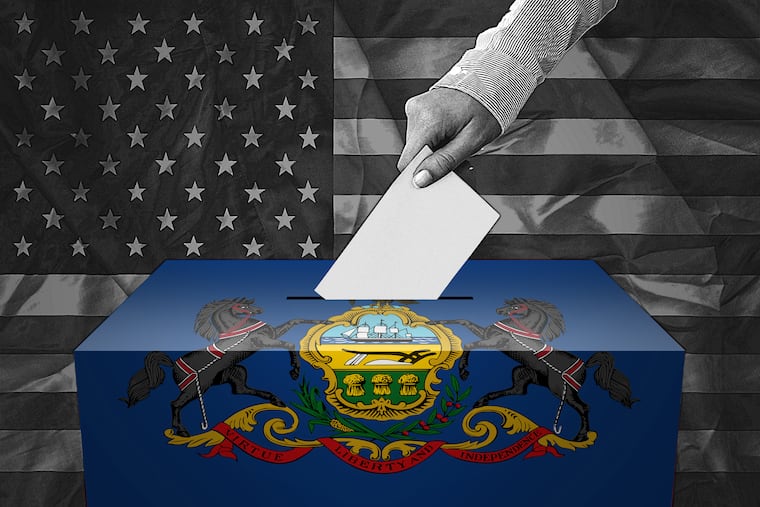Why every vote matters
Voter turnout will be crucial in Tuesday’s primary. One of the closest mayor's races in memory may help drive Philadelphians to the polls.

This Tuesday, May 16, is primary Election Day, and Philadelphians will head to the polls to help elect a new mayor and City Council. If past is prologue, most Philadelphians with the right to vote — here in the birthplace of American democracy — will choose not to.
The numbers tell the story: In the 2015 primary, the most recent without an incumbent mayoral candidate, 992,485 voters were registered, of which 776,690 were Democrats. Then-Councilmember Jim Kenney won the Democratic primary, historically a proxy for being elected mayor, with just 130,775 votes. In the 2019 primary, of one million registered voters, just 133,966 voted to reelect Kenney. The leader of the city of Philadelphia has, in effect, been elected by about 13% of registered voters.
There is reason for hope that this year’s primary will be different.
The mayoral race is among the most competitive in memory. Recent polling of likely voters shows a dead heat among five leading Democratic candidates. Both the quantity and quality of candidates in the race may help drive Philadelphians to vote, according to Pat Christmas, chief policy officer for the Committee of Seventy, a nonpartisan advocate for better elections. “This is a unique and exceptional field,” he told me. “For it to be this competitive and to have this many candidates with serious credentials” will help drive turnout.
Several election participants cite another factor: a palpable growth in candidate events, explanatory news media coverage, and broad-based community voter engagement activity across Philadelphia.
“Never in the city’s history have there been so many mayoral forums or so much news coverage on so many topics critical to the future of our city,” said the Rev. Luis Cortés Jr., the founder and CEO of Esperanza, a Philadelphia-based social services organization active in both city and national politics.
That’s partly due to Every Voice, Every Vote, a nonpartisan coalition of more than 70 media and community organizations generating issues-oriented news coverage and community engagement activities ahead of the 2023 elections. EVEV was launched by a group of civic-oriented philanthropies including the William Penn Foundation, the Knight Foundation, and the Lenfest Institute for Journalism — the nonprofit organization that owns The Inquirer — of which I am chief executive.
The project has focused on engaging the diverse and often underrepresented voices of all Philadelphians — through town hall meetings, church gatherings, conversations in barbershops, talk radio, televised debates, public service announcements on SEPTA, and social media. EVEV also fielded public opinion research that has guided issues-based media coverage and voter engagement.
“Community leaders have always been active in informing and preparing their neighbors to vote,” said Christmas, a former Northeast Philadelphia high school science teacher turned voter advocate. “But the number of forums and quality of nonpartisan resources made possible through the Every Voice, Every Vote initiative may be without precedent.”
The scope is citywide: 73 community and media organizations in nearly all neighborhoods, from Point Breeze to West Mount Airy to “El Barrio” along North Fifth Street. Eighteen voter guides in seven languages from Spanish to Vietnamese, over 60 community meetings on policy issues from public safety to education to housing, reaching groups from high schoolers to seniors, small-business owners to returning citizens. All of the work has been amplified by extensive TV, radio, digital, and print coverage. More than 50 local social media influencers have reached thousands of younger Philadelphians on Instagram, asking what issues matter most to them and encouraging them to vote.
It’s now up to voters to turn engagement into action. Former Mayor Michael Nutter told me that he remains concerned about Philadelphia voter engagement despite evident progress.
It’s now up to voters to turn engagement into action.
“People now have more information, more accurate information than ever before,” he said. “The question” — historically — “is, ‘Why don’t people vote?’” In the past, Nutter said, low turnout, at least in part, reflected poor civic communication. In Philadelphia, “we do a better job promoting recycling than voting.”
Among other reasons nonvoters could stay home is the influence of big money in the electoral process, a sense that large donors or wealthy candidates have their thumb on the scale such that individual voters hardly count. The Inquirer reported that this race is the most expensive in city history, with at least $31 million spent by candidates, donors, or political action committees. But past elections have shown that big spending is hardly decisive, and the rise in Philadelphia civic engagement has helped demonstrably to level the playing field.
As we approach this next election, it is worth remembering that some Philadelphians waited a lifetime but could never vote because of their race or their gender. And some Philadelphians gave their lives so that the rest of us could vote, whether during the Revolutionary War or the civil rights movement.
Philadelphians are not just voting for themselves but for their neighbors and their communities. Elected officials, after all, allocate resources to specific communities if they know that they turn out on Election Day. The best way to ensure a representative democracy is to stand up, be counted, and represent.
Perhaps the strongest motivator for voters is the simple fact that the election may indeed come down to a handful of votes. “A small number of voters and a small number of neighborhoods will, in all likelihood, determine the victor,” said the Committee of Seventy’s Christmas. “Every vote matters.”
Jim Friedlich is CEO and executive director of the Lenfest Institute for Journalism, the nonprofit organization that owns The Inquirer. @jimfriedlich